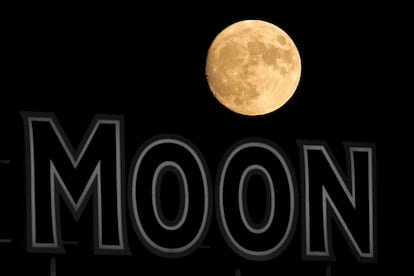What time is it on the Moon? Europe pushing for lunar time zone
For now, a Moon mission runs on the time of the country that is operating the spacecraft

With more lunar missions than ever on the horizon, the European Space Agency wants to give the moon its own time zone. This week, the agency said space organizations around the world are considering how best to keep time on the Moon. The idea came up during a meeting in the Netherlands late last year, with participants agreeing on the urgent need to establish “a common lunar reference time,” said the space agency’s Pietro Giordano, a navigation system engineer.
“A joint international effort is now being launched towards achieving this,” Giordano said in a statement.
For now, a Moon mission runs on the time of the country that is operating the spacecraft. European space officials said an internationally accepted lunar time zone would make it easier for everyone, especially as more countries and even private companies aim for the Moon and NASA gets set to send astronauts there.
NASA had to grapple with the time question while designing and building the International Space Station, fast approaching the 25th anniversary of the launch of its first piece.
While the space station doesn’t have its own time zone, it runs on Coordinated Universal Time, or UTC, which is meticulously based on atomic clocks. That helps to split the time difference between NASA and the Canadian Space Agency, and the other partnering space programs in Russia, Japan and Europe.
The international team looking into lunar time is debating whether a single organization should set and maintain time on the moon, according to the European Space Agency.
There are also technical issues to consider. Clocks run faster on the Moon than on Earth, gaining about 56 microseconds each day, the space agency said. Further complicating matters, ticking occurs differently on the lunar surface than in lunar orbit.
Perhaps most importantly, lunar time will have to be practical for astronauts there, noted the space agency’s Bernhard Hufenbach. NASA is shooting for its first flight to the Moon with astronauts in more than a half-century in 2024, with a lunar landing as early as 2025.
“This will be quite a challenge” with each day lasting as long as 29.5 Earth days, Hufenbach said in a statement. “But having established a working time system for the Moon, we can go on to do the same for other planetary destinations.”
Mars Standard Time, anyone?
Sign up for our weekly newsletter to get more English-language news coverage from EL PAÍS USA Edition
Tu suscripción se está usando en otro dispositivo
¿Quieres añadir otro usuario a tu suscripción?
Si continúas leyendo en este dispositivo, no se podrá leer en el otro.
FlechaTu suscripción se está usando en otro dispositivo y solo puedes acceder a EL PAÍS desde un dispositivo a la vez.
Si quieres compartir tu cuenta, cambia tu suscripción a la modalidad Premium, así podrás añadir otro usuario. Cada uno accederá con su propia cuenta de email, lo que os permitirá personalizar vuestra experiencia en EL PAÍS.
¿Tienes una suscripción de empresa? Accede aquí para contratar más cuentas.
En el caso de no saber quién está usando tu cuenta, te recomendamos cambiar tu contraseña aquí.
Si decides continuar compartiendo tu cuenta, este mensaje se mostrará en tu dispositivo y en el de la otra persona que está usando tu cuenta de forma indefinida, afectando a tu experiencia de lectura. Puedes consultar aquí los términos y condiciones de la suscripción digital.








































